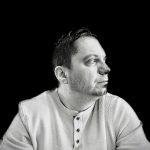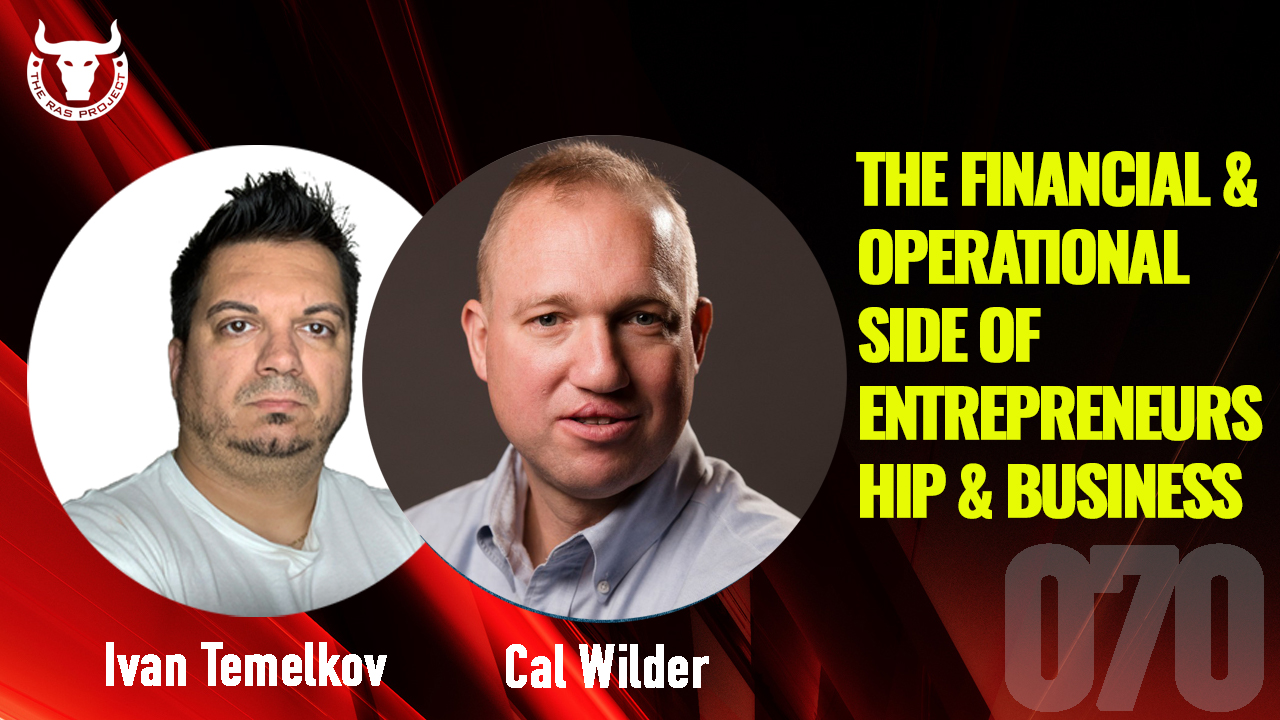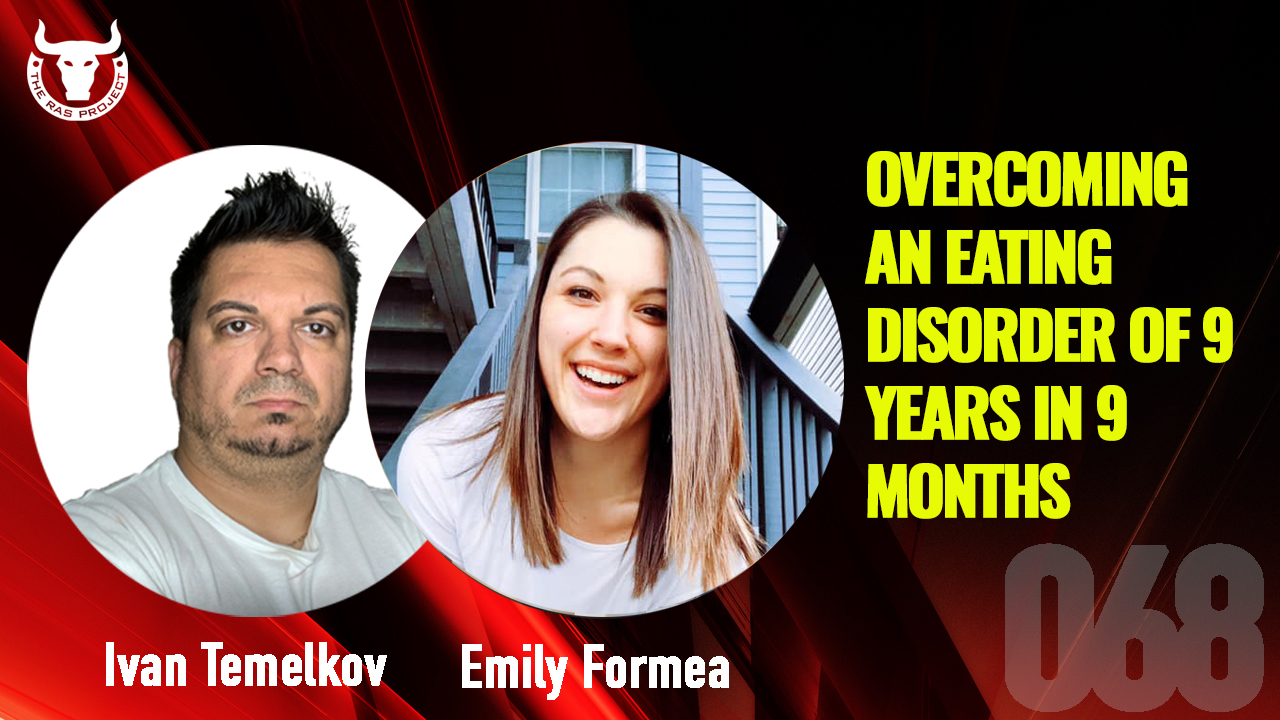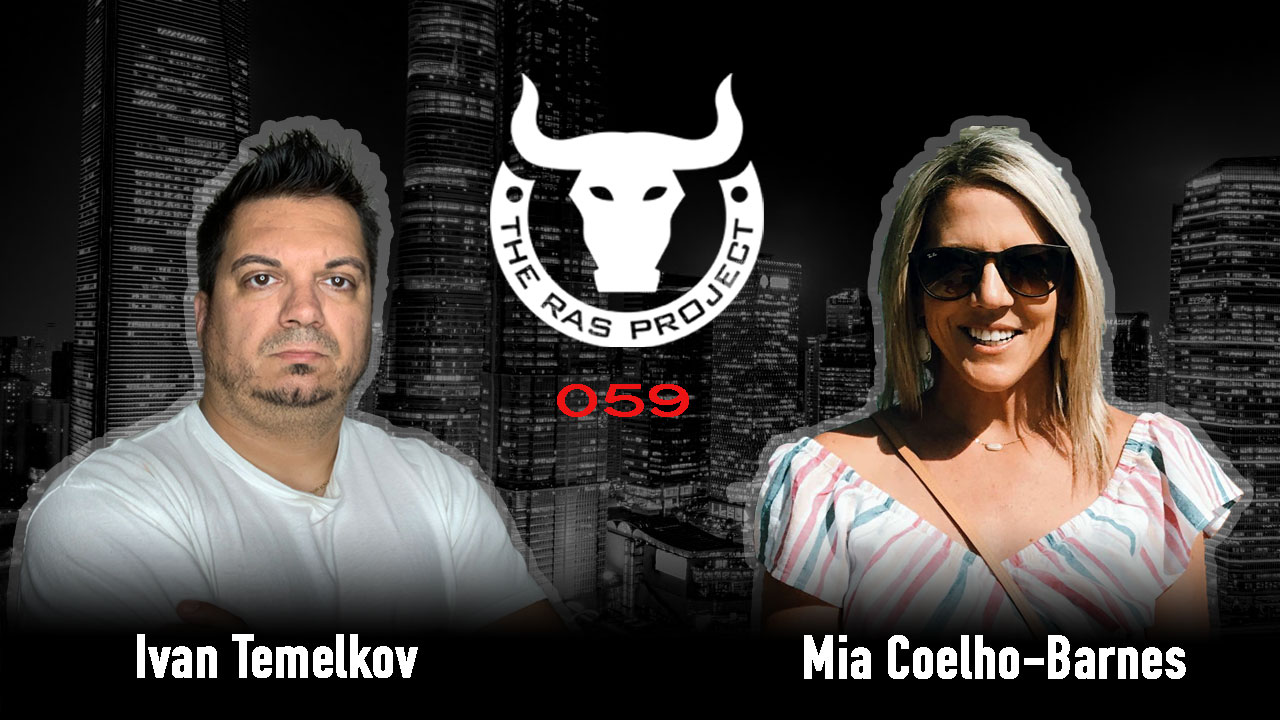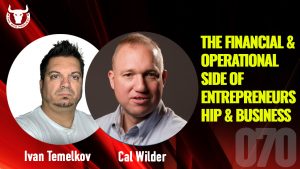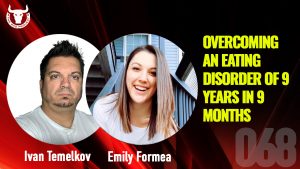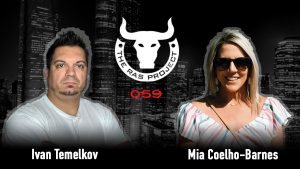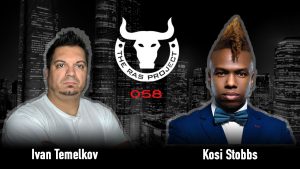Overcoming an Eating Disorder of 9 Years in 9 Months w/ Emily Formea - The RAS Project 068
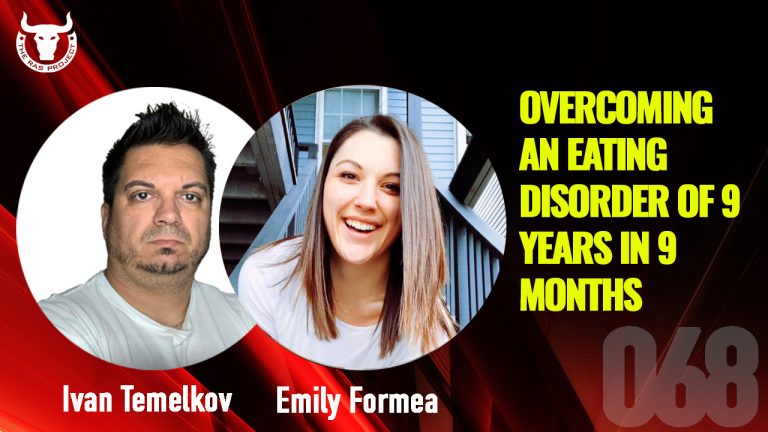
On this episode of The RAS Project, I was fortunate to speak with the amazing Emily Formea.
Emily Formea is a mindset coach for women struggling with eating disorders or disorderly eating! She recovered from her own eating disorder of 9 years in 9 months and has now created a business, blog, book and brand all around helping women with food. She graduated college 2 years ago with a degree in Political Science. Originally from Southern Illinois and now living in Boston, MA where her favorite thing in the world is coffee.
The RAS Project is available on Apple Podcasts, Google Podcasts, Spotify, and iHeartRadio. You can also watch in video on my YouTube channel and Facebook Watch.
- Apple Podcasts – https://ivnt.io/ras-on-apple-podcasts
- Google Podcasts – https://ivnt.io/ras-on-google-play
- Spotify – https://ivnt.io/ras-on-spotify
- iHeartRadio – https://ivnt.io/ras-on-iheartradio
Ivan Temelkov [00:15]
Welcome to The RAS Project. A conversation about life, entrepreneurship, personal development, family tech and marketing. My name is Ivan Temelkov and I’m your host. What’s in this podcast for you? Here you will find life-changing advice to help you level up every aspect of your life and business to help you reach your goals and dreams.
As always, all content is 100% real, raw, and unfiltered. Today, we have a very special guest on the episode I’m excited to chat with. Her name is Emily Formea. She is a mindset coach for women struggling with eating disorders or the sorter Lee eating a show recovered from our own eating disorder of 9 years in 9 months and now has created a business, a blog, a book, and a brand around helping women with food.
She graduated from college two years ago with a degree in political science. And she’s originally from Southern Illinois and now a transplant to Boston, Massachusetts, where her favorite thing in the world is coffee. Welcome, Emily. How are you?
Emily Formea [01:25]
Hi, and thank you so much for having me. Yes, we love coffee.
Ivan Temelkov [01:29]
Absolutely. Who doesn’t love coffee? I mean, let’s face it. First of all, I’m a big fan of coffee. And these days, I drink a black. And that’s actually a huge shift because I used to love my Starbucks lattes, honestly, until I realized that there were $3 to $5 a pop and let’s just face it when you have a couple of those a week. It just takes away from your bank account a little bit. So plus is not good for my intermittent fasting which has been going very well for the last eight or nine months and let’s just face a black coffee.
See, I found Seattle’s Best actually to be the best, believe it or not, because it’s actually the only coffee that doesn’t give me heartburn, believe it or not. So, thank you so much for coming on the show. You know, let’s start a little bit about you know, tell us a little bit about yourself. Take us way back to I want to hear more about the eating disorder. So how did that all happen?
Emily Formea [02:17]
Yeah, for sure. So I so I’m currently 23. I developed an eating disorder in the seventh grade when I was 12. I was actually diagnosed at that time with anorexia, which for people who aren’t aware is kind of the more mainstream eating disorder where I just tried to eat as little as possible. So I lost about 50 pounds in five months, and I found myself in a hospital. I was not doing well, like as you can tell. And from there, I think I always struggled with food, but I didn’t feel understood. And so it, it really hindered my recovery.
So I kind Have I struggled with anorexia for many years where I just didn’t eat a lot, but then I would kind of shift and I would go through binge eating or emotional eating. And then I would shift and I would kind of count every calorie and like start a new fad diet and then shift again and it just kind of took me all through high school and college. I just always struggled with food and I would see therapists or I was in inpatient back in seventh grade, and I always say like, I’m never like downing medical professionals like whatsoever.
I just think that there was a big misunderstanding and misconception with my eating disorder. And then with millions of women now in the same position where I just always struggled with food, but I felt misunderstood, because it wasn’t really the food and that’s kind of what I now coach on in my own business.
Ivan Temelkov [03:50]
No, no, no, it’s really interesting. You were talking about the the anorexic disorder, right? Is that so when you said you lost 50 pounds, it making an assumption here. So you had to be between 50 and 70 pounds roughly. I mean, that’s a very dangerous weight. Right? Hence why you you landed in the hospital is because you’re unstable. Right? So what was okay as you knew you had this disorder unless it Let’s face you probably didn’t have much control over.
I mean, you knew that you wanted to fix it, but you didn’t really know how, like, what really got you thinking into like, well, first of all to help yourself like what was going through your mind when you knew that, okay, I’ve got this eating disorder, I need to fix it. Like what was going through your mind, you know, in trying to figure out a solution for it?
Emily Formea [04:38]
Yeah, so I, I definitely think it was one of those perfect storms, which I talk a lot about is I had the personality profile where I was a perfectionist. I’m a very like type a type of person. I say I’m high strung, I’m very organized like and so if I set my mind to something, I’m going to achieve it And unfortunately, I think in our society now, especially young women, we’re given this formula of also having the perfect diet and the perfect body.
So I think it was just this perfect storm and this is I now speak to millions of people felt the same way as me. I didn’t fit the profile necessarily of like, I’m just really sad and I and I don’t eat enough like, there was so much more going on to it. I just felt like I had to control absolutely everything in my life to be good enough. And it ended up yeah, it took control over me and ended me in the hospital. And I remember being back in that time, really, truly believing that I didn’t have a problem.
Like I really believed that kind of just everyone was supposed to count calories, and everyone was supposed to try to be a size zero. And this was just my way of kind of coping with feeling anxious or feeling upset or feeling like that Not good enough. No, I think when I was in it, I definitely knew that I struggled with food. But I didn’t really understand that you weren’t supposed to. And that’s why I say like, I speak on eating disorders and disorderly eating. Because I think there’s just this kind of veil of like, everyone is always on a diet.
Everyone is always supposed to be thinking about what they’re eating. Like, that’s normal, quote, unquote. You know, yeah, I didn’t really think I knew that I had gone a little bit too aggressive. But when I left the hospital, I was actually supposed to be in the hospital for three weeks, and I left in about four days, because I was just kind of a high achieving kid, like, I had great grade. I was super like involved in my school. I just didn’t fit that profile.
And so I was kind of like, Oh, I don’t know, I’m just not very hungry and, and kind of just went on with my life because there was this major gap of understanding, I think, in eating disorder recovery.
Ivan Temelkov [06:58]
So the reason one of the reasons that I asked that is because it’s really interestingly talked about how I think women don’t necessarily kind of, I think it’s between men and women, there’s a difference in realizing that you have, you know, an eating disorder or, you know, maybe not not eating healthy enough, you know, just I think it’s the way that we perceive it between men and women.
It’s just our way of thinking and approaching it. So I’m just curious to knowing like, you know, how did you approach it? And how did you start thinking about a solution and realizing that you know, that I do have a disorder, you know, an eating disorder, and how should I approach it? How should I resolve it? How do I get it on a control, right? One thing that I wanted to talk about before actually, I forget here is I was reading through your bio, actually, so and this is something that’s really unique about you.
So you mentioned that you graduated with a political science degree so like, it’s really interesting political science and then doing this right now being a coach, you know, and helping women with eating disorders. You got to go To show like, Okay, great, I did the degree thing, but by the way, I’m going to do something different, right? all too familiar because it’s exactly what I did is, you know, kind of veered into a different direction.
But you also, you know, something interesting about you is, is when you move down to DC, you work for the House of Representatives for nine months. Okay, how did how did that happen? Let’s talk about that for a minute.
Emily Formea [08:23]
So I can kind of go so in college, I was studying political science. I actually graduated in three years because I had gotten an internship to go out and work for the house representatives for like the summer time, and I thought, Oh my gosh, this is my dream, like I should graduate and go out there and try to just get a full time job. So I graduated in three years with my bachelor’s in political science, I moved out to DC.
And during this time, I was struggling with food still, like everything in my life was quote, unquote, perfect, but I was always counting calories. overexercising and all of this so I moved out to DC. I did work for the house for nine months, I adored like everyone I met. It just wasn’t really, for me. And I think like, your podcast is so much about entrepreneurship as well. I think it’s really cool. Because looking back on my story, I always had a passion to help people.
But I didn’t know how. So I went into college just kind of being like, Sure. I’ll do politics, I guess like, and I just picked a career with my always like intention behind it. So I moved out to DC and I hated it. And I like definitely went through kind of this like, then I’m the problem like, why do I not like this, I studied this. This was supposed to be my dream, forgetting that I could always use my kind of goal of helping people in different ways and politics, wasn’t it?
That was Okay, so that was actually my crash, which is what spiked my recovery, because I think I was finally faced with like, Who am I What’s going on? I hate political sides, I just graduated in this degree. I hate struggling with food, like it really, really pushed me to just kind of have a fork in the road and go and like this is the advice I give to people who really just want to take that step towards recovery.
It was like, um, you can keep struggling, like, it’s pretty painful, you know that your eating disorder is painful, and it ends in pain it has this entire time. Or you can choose recovery. And it’s also painful. Like, I’ll never say recoveries easy. It’s super painful, but it ends in pain free. So I was kind of just at this fork of like, okay, it’s my decision, and they’re both not great, but one of them is totally worth it. And no one has kept me in this cycle for 10 years.
Ivan Temelkov [10:47]
So there’s a few things and I was trying to make a mental note as you’re making that statement that I think are really important to mention here because I think as human beings we all experienced these things. So go on. Back to you going to college and studying political science. I think it was the push of what traditionally in the world we’ve been taught, right is let’s think about it.
So when you’re growing up being told, go to school, get good grades, get married, have a family, have a house, a couple of cars, save some money in the bank. What’s the funding that that’s the traditional way of living? Right. So I think, you know, based on what you were saying is that you were sort of stargaze by the House of Representatives, because hey, it’s the House of Representatives.
This is an opportunity of a lifetime. But then as you got into it, you started to realize, you know what, this isn’t my true calling. This isn’t my why this isn’t my purpose. And I will tell you this. There’s even successful people out there who make millions of dollars that hate what they’re doing, because they haven’t truly found their why and their purpose. I know I’ve worked for some people who run successful companies, but they’re miserable because they’re just at this point, maintain Status Quo because they think that’s the only way to live a life.
And honestly, that’s a very, very saddening way to live a life because, you know what, when you’re staring in the face of death, and let’s face it, it’s inevitable. We’re all gonna die. Now, I don’t care who you are, as long as you’re a human being, you’re gonna die one day, right? But when you’re staring at the face of death, and you reflect and you look back at your life, what would you want to remember?
Would you want to be happy and say, You know what, I did this, I really enjoyed it. I accomplished that. We’ll just say, you know, I worked for a job and made a lot of money, but I was miserable as fuck, you know?
Emily Formea [12:36]
Like, it’s that same? Yeah, it’s the eating disorders. It totally you have this image of like, right okay, so this is what I’m supposed to look like to be happy. And then you try and you try and you try and I think unfortunately, what happens is you actually do get it just like that example with like people who climb the quote unquote, like nine to five ladder, you can do it.
What’s so heartbreaking to me is that Then when you do it, you still don’t have the feelings that you thought it would bring you and you turn you do a 180. And you blame yourself not the formula of society. You go, oh my gosh, then like, I must be the worst and I suck. Why didn’t I do this? The whole being good enough, like, that was new every single time I would lose five more pounds. I felt 80% worse, like, I was like, I feel unhappy.
Ivan Temelkov [13:26]
I think you were it was the victim card. And honestly, I think females play that card more than males do, because let’s face it, we live actually in a in a very self centric, predominantly male driven world. In fact, you know, anytime I have a female on the show, I’m excited because it’s a breath of fresh air, because I mostly have dudes on the show.
That it’s, you know, nothing wrong with having dudes but like, the female perspective is great. You know, also, it’s an attributing factor to society to the world. It brings a different perspective. But I think Let’s face it, as a female, you’ve got this pre fabricated image that I’m supposed to look good. I’m supposed to exercise I’m supposed to eat while I’m supposed to be perfect. That is complete bullshit.
Like, no woman should be doing that, honestly, you know, it’s, it’s a choice, right. But a lot of women also struggle with that. There’s an actual real problem, you know, especially Believe it or not in the United States. I mean, you probably notice over 60% of people are obese. And largely because fast food is accessible. I mean, I can take my ass down to the McDonald’s drive thru and get me a fucking cheeseburger for $1.
Right, who wants to make a sandwich, right? Who wants to spend 10 minutes making something healthier? Right. So yeah, it is very challenging for women. Right?
Emily Formea [14:46]
I love that you brought up victim because I use that. Well, at first it was very hard for me to say like I was a victim to my eating disorder. But I think victim has such a negative connotation in reality. It’s the most empowering thing. You can say, because you’re finally taking your voice back, like, the way that I explained the victimhood of women with diet culture, is we hear this voice in our heads that says Like, don’t eat carbs, carbs are bad.
And then we go, okay? And we just kind of like do it like we don’t ever I once read a quote that was like, as much as you listen to your brain, you can talk back to it just as much is don’t like we hear it. We listen to these commercials about like, do this slimfast take this diet pill, do this, whatever. And we go, okay. And we just don’t think for ourselves like I truly every and when someone once said to me, like, are you playing victim to your disorder?
I got so mad. I was like, how dare you like, this is so hard, like, you’ve no idea. And then I realized that I truly was. And that gave me the empowerment to holy shit like that means I can talk back to it and that means I can change it. This isn’t how it always has to be.
Ivan Temelkov [15:55]
Well, you know, I think the reason you were talking about that quote, and and Being able to talk back to your brain is I think, especially females, I think are so concerned with the outside of perception from the world and worrying about the judgment. And I will tell you this, you know, especially from a life and from an entrepreneurial standpoint, two is the minute I turn off the news, the minute I turned off more of social media, and I do a lot of personal branding, but as soon as I turned off, like I don’t give two shits about what someone else thinks, like really focusing on myself.
I even did a Facebook Live about it earlier today is the minute you focus on yourself, like really dial yourself in, like, personally, six years ago when I started cycling, still to this day, I have no fucking idea how that happened. And it wasn’t really about the endurance factor for me. It was about the mindset aspect of it. And every time I feel like I’m lost every time I feel like I need clarity or focus. I’m out on the bike, doing 20 3040 miles, you know, sometimes close to 100 miles per week, pedaling on online. bike, because it gives me clarity.
It gives me It gives me focus, it gives me peace. And I think that for women, and you know, being being being a husband also, I said that in my wife personally, is this that the internal struggles that there are the internal battles, and I think women are, you know, and this is probably unintentional failed to be expressive about it, and fail to be vocal about it, because they’re worried about the judgement that people are going to pass upon them.
And that’s, I think, exactly what you were talking about, is about playing the victim card upon yourself, right and saying, It’s my fault, you know, immediately, right, because I think women do more more of that than men do. Because they’re like, I don’t give a shit. And you know, I’ll eat a freaking Twinkie or whatever. Women are like, Well, you know, feeling depressed, feeling stressed out, and then you take to food and then you play the victim victim card, right.
So I think what the eating disorder is, I think you said that there was a lot of that happening right? until you realize that no, the victim card is not a solution. I need to start thinking more solution oriented in terms of how am I going to get out of this rut? How am I going to change my eating habits and I have the power to do that. Nobody else you have the power to do that. And honestly, whether you’re a male or female, you have the power to do so many things.
People don’t realize how much potential they have, until until they get so dialed in. So dialed in and they realize, holy shit. I didn’t know I could do that, you know, because they’re worried about the minutiae of mediocrity of society. I mean, we’ve really seen it with everything that’s been happening with this pandemic, and what 5 million people filing for unemployment, because they’re scared shitless I mean, that’s an indication that there’s a lot of fear in America, both for male and female, right?
So it’s not just you know, what do you have an eating disorder or even an entrepreneur, but it’s all around. It’s just on a grander scale. Right? So going back to, you know, the reason I had to ask about the House of Representatives is just to kind of emphasize on the fact that I think too many people have stargaze like, you know, when you’re young, and I want to be an astronaut, or I want to be a lawyer, or I want to be a doctor.
And then you know, maybe your parents are lawyers, and maybe they’re their doctors, and then they kind of want you to follow in their footsteps. I know, as an Eastern European, you know, my family wanted me to go to college, I decided to drop out of college, go out and do my own thing. But years later, and even though my father’s an entrepreneur as well, he’s trying to come round and I was having a full time employee on board too.
He’s like, Oh, shit, he’s like, it makes it more believable. Right? But it’s believable because you’re gaining traction. And most people will be in disbelief, especially when you’re battling your own battles. Not just with with an eating disorder, but just battling your own battles, because everybody has them. You know, it’s trust or depression or eating disorder or being overweight or whatever it might be. Everyone has them.
We’re all human beings. And this is part of why this podcast exists is to bring on people like you to talk about different things and share, you know, perspective. So let’s talk about how you help women specifically okay, because there’s just literally what I think I probably need to do for the rest of the year is booked more females on my podcast because I feel like you guys bring so much, you know, a fresh perspective right to the podcast. Let’s talk about how do you when you work with women like what specific things do you help them overcome?
Emily Formea [20:36]
Thank you. Yeah, I and I want to say like I I also like, totally am aware that men struggle with food too. Like I always say that I like eating disorders do not discriminate, but I specifically work with women just because I don’t have a degree I only have my experience. I only have my experience as a woman. So I just always like to say that like I am here to talk and listen to anyone.
I just kind of If that’s my actual business is working with women. I think it’s interesting because I actually don’t. When I first started my business, of course, I had like the mind drama of Who am I to do this? I have no degree in therapy. I have no degree in eating disorders. Like I truly had all of that. Yeah, the voice like just me being like, yeah, you’re right. And I realized that like to anyone who wants to, yeah, be an entrepreneur or just really do anything in life, I realized that like, I was my first client, I had done it.
So whenever I said like, I don’t have a degree, I don’t have the money. I don’t have all of these things. I was I was truly the one that had had a really bad eating disorder, struggled with food and then didn’t and that was all the proof I needed to believe in myself. And I think I love that you touched on the belief factor as well because there’s two major things that I work with with with my clients.
One of them is that self deprecating language and action and bullying yourself and hating yourself. is never going to bring about self confidence or self certainty or, like the mathematical equation is just off if you put in a whole bunch of just like negativity and hatred towards yourself and like, yeah, this is people who struggle with any mental illness, people who struggle with overeating under eating like debt, any type of like struggle that you’re going to go through in life, the worst thing you can do is to also turn on yourself, because then nobody’s supporting you and nobody believes in you.
And so I think that’s the first thing I help them do is release the guilt and the shame and the I help them disassociate from their disorder. Because eating disorders from my experience, I always thought I was the problem I was the issue I was the failure like identified with all of these things. And as you can disconnect, that, you start to support yourself to almost fight off your disorder.
So I think that’s the first thing that’s like really important to do. And the second thing is to just, I truly think does validate what they’re saying saying like, I think I’ve somewhat become the girl that gets it. That’s what I like. That’s what a lot of my clients call me. And that’s what I always wanted to be. Because at the end of the day, I just so deeply understand how they’re feeling, what their fear is, what’s going to come up next.
Like as they go through recovery, that I’m, I’m aware of, you know, where they are here. And they can somewhat see me as where they will truly be. I think it’s so powerful to talk to people and hear people because this helped me in my recovery of people who have done it, not just studied it. And that’s like the whole argument with like, go to college or build your own visit, like people who have done it and taken those actions are limitless. And because there’s just certain things that you can’t study in a book.
Ivan Temelkov [23:46]
Well, you know, a couple things I want to touch upon because I can 100% relate to everything you just said. First of all, I think the reason you work with women is because they’re relatable. You’re a female yourself. And like you said, you’ll have better Your own client. So now you’re actually a testimonial of yourself. And that’s probably one of the best testimonials that you can have is to say, I have done it. I have achieved this if I can achieve it, I can show you how to do it. Right. You have to believe in it, which that’s a whole another story.
I think you were talking about education. I mean, I’m a guy who got my education from the School of Google. I shit you not. And you know if that’s not enough is six years ago, I was brought on to build a curriculum of a continuing education program at the University of Missouri in St. Louis for search engine optimization, search engine marketing, because I learned all of that through Google practice did within companies that I worked for, and then generated seasonality and experience and I will tell you this these days now more than ever, this is probably going to change companies hire on experience.
They still care about degrees. But now more than ever don’t give two shits. In fact, some of the best gamers in the world don’t have any official education that make like $100,000 per year, you know, sitting in a gaming chair every single day, because they’re passionate about it. They love what they’re doing. And that’s what companies want. They want people who are genuinely passionate, and they’re the best at what they do.
Because the reality about education and mind you follow guys like Gary Vaynerchuk, who talked about you know, you don’t you don’t the education system is so behind, right is that you’re gonna learn more on the internet and you’re going to learn because you have practicality, you can you can have practicality, whereas the traditional environment is you get education, but you got no practicality. And that’s what companies want.
Right. So I think the reason you’ve also veered off is is that relatable your target audience were women. Secondly, is this that you were passionate about what you were doing, and you knew what you were doing and you could replicate it? Well, that’s a recipe for a business. itself to where you can teach other women how to how to do that. And honestly, there’s a lot of women out there that struggle with eating disorders, you know, and a vast majority of them are unwilling to admit it. And another thing you also mentioned, because I think a lot of women struggle with self confidence.
And I haven’t talked about it earlier today on my Facebook Live is this that, you know, if you don’t believe in yourself, you can’t ask others to believe in you. They won’t you just how it works, because you don’t come across as confident. You don’t come across, sometimes an assertive and they get the sense that you know what you’re talking about. You got to work on yourself confidence. That is the biggest thing.
And honestly, I’m also prime proof of that, because the last two months, my business has grown tremendously whenever everybody else is probably collecting unemployment checks, you know, so that’s another thing and I think it’s equally true for women, you got to build that self confidence, not just for women. It’s really for anyone Gotta have self confidence, especially as an entrepreneur, if you want to build a business, if you’re passionate about something, and you want to share it into the world.
So it’s great that you mentioned that, that you know, so let’s talk a little bit about, you know, on the self confidence side is, what are some things that you encounter specifically, just to get even, you know, more specific, you know, with the types of different women that you work with, you know, when it comes to eating disorders?
Emily Formea [27:26]
Yeah, so I I definitely think, I think this is when diet culture really kind of plays the main role and kind of this like, the eating disorder fairytale is what I call it. We see on social media and we see online we see on TV, all of these like what are all the media that very thin, beautiful, attractive, women have perfect lives, and then everyone loves them, and that the way that they get super thin and modelesque is by dieting, and so then when you have me at 12, and millions of other women at 12 going, Oh, like my body’s starting to change, right?
I’m experiencing insecurity. Oh, interesting what a great solution I’ll just die it look like that and life will be fine and we it’s it is the weirdest phenomenon I’ve ever really like looked at from an outer lens now, of then you take that sort of formula and you also take that women more often than not are just more high strung, we are usually more type A, we’re more people pleasing, we’re just kind of more malleable in the sense of like, our self worth and our self confidence. So then you take this a major, you know, group of individuals and you create a billion dollar industry off of it off of saying that, like if you don’t feel good, go on a diet, if you don’t, if you lack self competence, and your body will just change your body, not realizing that like what we’re lacking is emotions.
And so it’s not going to make a difference. Like I always use the example when I weighed my lowest weight. should always, of course been my goal weight. And I was like, this will make me so happy, everything will be fixed, like the world will be good like glamorous. I was more insecure in my body than I’ve ever been in my entire life. Because my problem wasn’t my body. My problem wasn’t my suit. And I think women with the confidence factor of it, we just at the right age of kind of being unsure of who we are, are just force fed, like, Oh, well then just change a couple things in your diet.
And the other thing was food struggles. If you do it once, you’re going to do it your whole life. Because if you’ve adopted the belief that the problem is worth your weight, if you a year later run into a problem, you’re going to think I should go on a diet like it becomes a coping mechanism just like alcoholism, just like, you know overeating, like it just becomes your kind of default of how to cope with not feeling good enough, instead of raising women especially to understand that like feeling bad, doesn’t make you bad and that being pretty Perfect is like an illusion.
Like, instead of raising women to have a sense of self certainty, I think self certainty and self compassion are the two that I talk about the most. We’re just kind of thrown into the wringer with like, oh, but just go on a diet. And, yeah, that’s exactly what happened to me.
Ivan Temelkov [30:18]
Well, I thought that was a really, really great powerhouse of a segment right there in itself and actually, you know, kind of goes hand in hand with exactly what, you know, I was hoping to chat with you about which is, you know, the perfectionism mantra that I think has been kind of created, especially for women like you talked about, and also the fact that you know, the need to always be in control and to know that you are good enough, right?
You know, everyone is good enough, especially women, you are good enough, but you can always improve if you want to, that’s a choice. You can make. Nobody’s forcing you to do that. But then I think what you help women do is realize that they have a choice. Because everyone’s good enough. I mean, I know, you know, especially when I talk to my wife, right, I said, you know, whether you choose to eat healthier, totally up to you, you know, you’re gonna feel better because I know when I shifted with my eating habits is, you know, occur my heartburn.
That’s in part why drink though Seattle’s best coffee is because a lot of people don’t know that Starbucks coffees actually burnt. And that’s in part, what gives you heartburn, they burn it for the darker, richer flavor. A lot of people don’t know that. In fact, I had a guy probably a couple of years ago or so on on the podcast that actually was starting a Coffee Company being company was kind of educating me on that, too.
So with that being said, you know, I’m really excited that you know, I had you on the podcast to talk about all of this, especially how you help women, you know, with eating disorders and creating solutions because there are a lot of women out there who struggle with that. Before we wrap things up on This episode let’s throw out some handles. How can people connect with you out there especially women who you know want to establish that self confidence and maybe they have an eating disorder as well?
Emily Formea [32:12]
Yeah, no, I this has been so great. I really have like, I could talk about this forever. And I yeah, you can find me on I have a website which is probably the easiest. It’s www.sincerelyxoemily.com. My Gmail account is the same way so you can email me at sincerelyxoemily@sincerelyxoemily.com. And then the final one is my Instagram. It’s @sincerely.xo.emily, but there’s periods so it’s sincerely period, xo period, Emily, because the other one was taken.
But yeah, please like feel free to reach out to me and I always say as well like even if you’re questioning it, because I get this a lot from women where they say, Well, I just like eat clean, but like I’m pretty okay with food. If you’re even questioning it. I really, really encourage you to still reach out to not even me to someone because Having fully a life of food freedom is so so different than being like, Oh, I’m on a diet like it’s fine.
So I just yeah, I really want to encourage you that you don’t have to struggle with food in any way. And you do deserve to recover from however you do struggle with food.
Ivan Temelkov [33:17]
Well, Emily. Thank you so much. You know, I really enjoyed this, this this conversation and first of all, I want to say congratulations, also once again, to developing the self confidence in the mindset and and really enforcing the willpower to overcome this eating disorder and also get you on track to where you feel more fulfilled and happy and everything that you’re doing in life.
Emily Formea [33:42]
Thank you so much. I so appreciate it.
